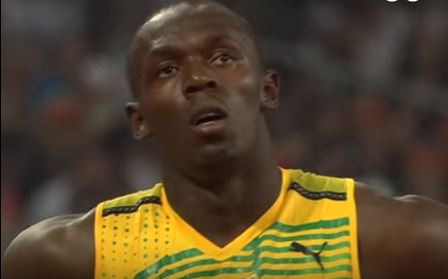
Sky Sports: “Usain Bolt: What Makes Him The Fastest Man In The World? Sky Sports Investigates” By James Dielhenn
Usain Bolt is the fastest man on Earth. Fact. His 2009 world record in the 100m coupled with gold medals at two Olympic Games mark him out as THE man to beat at the Olympics in Rio this month.
In the latest part of Sky Sports‘ data analytics series on the summer of sport, we’ve teamed up with Hewlett Packard Enterprise (HPE) to crunch Bolt’s awe-inspiring numbers to find out how he has raced into the world’s affections.
Bolt’s world record of 9.58 seconds was set in Berlin at the World Championships.
He remains undefeated in major finals since 2008. The only blot on an otherwise flawless record is his disqualification for a false start in the 100m at the 2011 World Championships in South Korea. He went on to claim gold in the 200m, though.
In Berlin, at the 2009 World Championships, Bolt broke his own 100m world record of 9.69 seconds, set when winning gold at the 2008 Olympics in Beijing. He left Tyson Gay and Asafa Powell in his shadow, recording a barely believable 9.58 seconds.
Was Bolt destined to become the fastest man ever?
Well, not necessarily. It is impossible to compare Bolt’s world records with the times set prior to 1964 because of the change from manual to automatic timing (making the process far more reliable and accurate).
From 1977, all major events became automatically timed. In the 43 years until Bolt became a renowned force, the world record dropped an average of 0.008 seconds per year – from Bob Hayes’ 10.06 seconds to Asafa Powell’s 9.74.
Bolt’s brilliance is justified because he extended the 0.008 seconds-per-year average to 0.10 seconds when he improved his own 9.72 seconds world record to 9.58 in little over a 12-month span.
This proves he is not merely the current incumbent of a world record that has gradually decreased – Bolt is setting the bar with higher standards of improvement.
speed = distance / time… so what’s his average/top speed?
- He ran 100m in 9.58 seconds
- 100/9.58 = 10.44 metres per second
- 10.44 metres per second = 23.35 mph
- 23.35 mph is Bolt’s average speed over 100m
- He ran between 60-80m in 1.61 seconds = 27.79 mph
So, Bolt’s top speed (and the fastest that anyone has ever run) is 27.79mph. He reaches these heights for just 1.61 seconds, between the 60th and 80th metre of the 100m race
Distribution of speed (from 2009 world record race)
- 0-10 metres in 1.85 seconds
- 10-20 metres in 1.02 seconds
- 20-30 metres in 0.91 seconds
- 30-40 metres in 0.87 seconds
- 40-50 metres in 0.85 seconds
- 50-60 metres in 0.82 seconds
- 60-70 metres in 0.82 seconds
- 70-80 metres in 0.82 seconds
- 80-90 metres in 0.83 seconds
- 90-100 metres in 0.90 seconds
Has he always been fast?
The simple answer is yes. Bolt won the first of two world junior titles at the age of 15. He was the first junior to break 20 seconds for the 200m in 2004, when he was still only 17, sprinting home in 19.93 seconds to win gold at the CARIFTA games.
It was later that year that Bolt was hampered by the first of a number of injuries as a teenager. He endured a disappointing trip to the 2004 Athens Olympics, finishing last in the first round of the 200 metres.
He would begin to realise his potential after linking up with coach Glen Mills, the man credited with nurturing his raw talent, but there would be more tough times ahead.
Bolt suffered another injury in the 200m final at the 2005 World Championships and would cross the line in last place, while a hamstring injury forced him to miss the 2006 Commonwealth Games.
But the fit-again Bolt would win a silver medal behind Tyson Gay in the 200m at the 2007 World Championships, signalling the start of his success in major competitions. 2007 was also the first time Bolt tried his hand a 100m, the distance that would define him.
Who has beaten Bolt?
Just a month before the 2008 Bejing Olympic Games, Bolt was beaten by fellow Jamaican Asafa Powell by a hundredth of a second in a 100m final in Stockholm. Bolt swiftly shrugged of this loss and would claim three gold medals in China.
Two years later, yet again in Stockholm, Tyson Gay would inflict another defeat on Bolt in a 100m final. The American, who had run the second-fastest men’s 100m a year earlier, powered to a resounding win over his sprint rival.
Justin Gatlin defeated Bolt in 2013
Bolt would suffer a 2013 loss to Justin Gatlin in the 100m Rome Diamond League meeting, raising fresh questions about whether his dominant era was nearing an end. The Jamaican had been struggling with a sore hamstring and silenced his doubters and Gatlin by winning three more gold medals at the 2015 World Championships.
Is he genetically gifted?
Bolt can complete a 100m race in just 41 steps – indeed, he did exactly this during his gold medal effort at London 2012. His nearest rivals, Yohan Blake and Justin Gatlin, took 46 and 42.5 steps, respectively.
Bolt’s weakness, his critics will claim, is his start to a race. However, in his 41-step march to claiming gold in London, his reaction time off the blocks (0.165 seconds) was quicker than Blake (0.179 seconds ) and Gatlin (0.178 seconds). If he starts ahead of his challengers, those long legs will almost certainly carry him through.
Tall, skinnier sprinters are more biologically suited to running quickly, according to the Journal of Sports Sciences’ Professor Alan Neville. A greater skin surface area allows heat to leave the body faster enabling muscles to work harder, the research suggests. This may help to explain how the 6’5”, 12-stone Bolt shaved 0.30 seconds off the world record previously held by the 6’2”, 13-stone Carl Lewis.
Is Bolt better at 200m than 100m?
Bolt has enjoyed a lengthy reign as the world’s 100m champion, but is also a dominant force over the longer distance.
Since the age of 15, Bolt has been a 200m specialist, and he posted the fifth fastest time of his career to take 200m gold at the 2015 World Championships.
Bolt was 0.19 faster than Gatlin in second place and has hinted in the past that he prefers the 200m.
“I think the 100m is a lot harder because you have to get everything right correctly and if you make just one mistake that’s how a lot of people lose races.
“In the 200m it is easier. If you make a mistake then you can go quicker in the second half.”
Is he getting slower?
Bolt remains the world’s dominant sprinter, but ‘Father Time’ catches up with everyone and at the age of 29, his blistering speed could have lessened slightly.
He has been unable to improve on the world record times which he set for the 100m and 200m in 2009, during a spell when Bolt appears to have been at the peak of his powers.
Stats continue to suggest that Bolt’s searing pace is slowing a little, with his medal-winning times pointing to possible decline. Bolt clocked 9.63 seconds and 19.32 seconds to retain his 100m and 200m titles at the London 2012 Games, while he claimed gold with times of 9.79 seconds and 19.55 seconds at last year’s World Championships.
More medals in Rio?
In the past eight years, dating back to his first gold medal at Beijing 2008, Bolt has won every race that he has entered at an Olympics or World Championships – except for the 2011 World Championship final, in which he was disqualified for a false start, allowing fellow Jamaican Blake to take top prize.
He is the first man to win six Olympic golds in sprinting, and is a five-time world champion.
What’s his 2016 form like?
- Bolt is the fourth fastest man at 100m in 2016 with a best of 9.88secs
- Bolt stands fifth in the 200m world rankings this year at 19.89
- J Gatlin (9.80), T Bromell (9.84), J Vicaut (9.86) have run 100m faster
- 2016 record in 200m is 19.74secs. 2007 was the last time Bolt failed to clock a time under 19.70
Bolt himself recognises that he cannot maintain this remarkable record for much longer, and plans to retire after the 2017 World Championships in London.
But Bolt, with his physical gifts and natural talent, will be expected to add even more gold medals at the Olympics in Brazil.
Credit: Sky Sports




